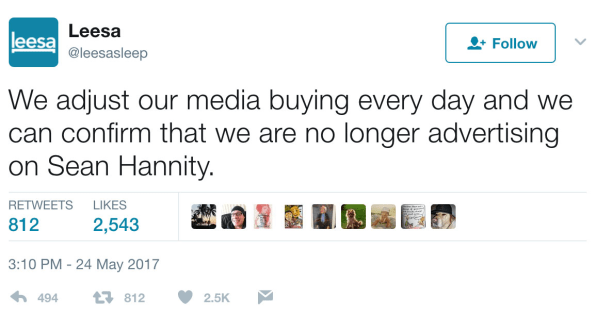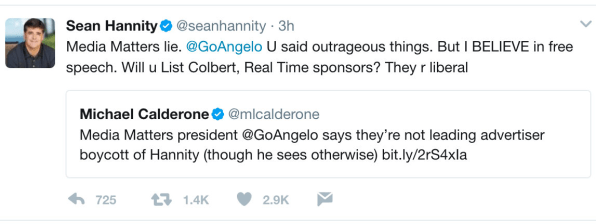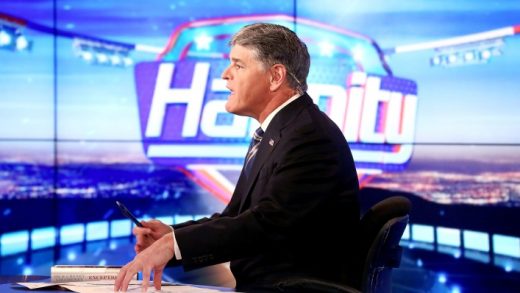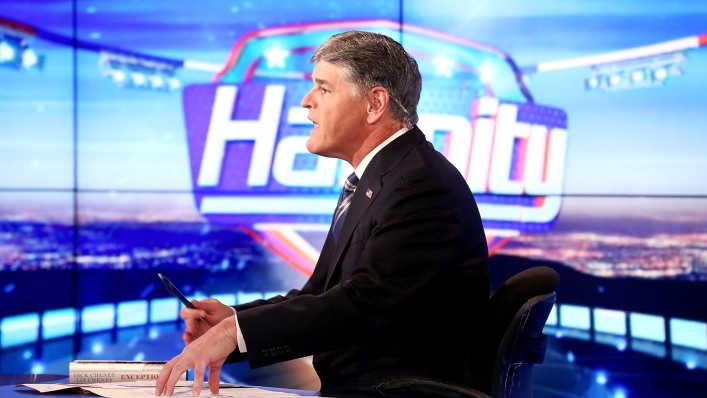The Guy Who Helped Take Down Bill O’Reilly Is Now Targeting Sean Hannity
News depends on ratings. The more viewers, listeners, or readers a cable show attracts, the more advertisers will pay to reach that audience, and that axiom has often helped insulate top-rated news personalities from the consequences of their misdeeds for years. But it may no longer hold, especially in the face of an onslaught of outrage from outside that star’s fan base. As much as advertisers coveted Bill O’Reilly’s millions of viewers, they didn’t want to alienate the other people who perceived him as a sexual harasser (based on claims he continues to deny). The first advertiser defections are now happening to O’Reilly’s erstwhile Fox colleague Sean Hannity, over his support of a stale conspiracy theory that’s tormenting the family of a young man murdered in 2016.
Angelo Carusone, the 35-year-old president of the liberal watchdog group Media Matters for America, helped bring down O’Reilly by publishing on April 4 a list of O’Reilly Factor advertisers that was picked up and expanded by other campaigners demanding a boycott. Other groups, like anonymous Twitter activists Sleeping Giants, also played a major role. By April 19, O’Reilly lost more than 50 advertisers and his job.
On May 23, Carusone published a similar list for the Sean Hannity Show, which is already starting to lose sponsors such as Cars.com and mattress makers Casper and Leesa. The pundit has drawn ire for promoting a conspiracy theory about Seth Rich, the 27-year-old Democratic National Committee analyst who was shot and killed in Washington, D.C. on July 10, 2016. Police believe it was a botched robbery; conspiracy theorists believe it was an assassination—payback for Rich allegedly passing on to WikiLeaks embarrassing DNC emails that contributed to Hillary Clinton’s defeat. There is no evidence to support this theory, and it flies in the face of conventional wisdom (the conclusion by intelligence officials that Russian hackers infiltrated the DNC’s computer system all on their own). Rich’s family has implored the media to stop reporting rumors. Fox itself has been puling back, retracting an online story on May 23.

I spoke to Carusone about the Hannity uproar, how it differs from the O’Reilly campaign, and the strategy of enlisting advertisers as guardians of journalistic integrity.
Fast Company: What is it about Hannity that merits an advertising boycott?
Angelo Carusone: I would say volatility. In the wake of the O’Reilly campaign we ran a full-page ad in the Hollywood Reporter about the importance of knowing where your dollars are being spent and to avoid the next crisis. The advertiser list around Hannity is actually in the context of that conversation. He has demonstrated real volatility here, not just because of the subject matter but in the way that he has antagonized Fox News throughout the process, which shows that he is not dependable, that he is reckless. And the reaction he’s had I think proves that he is not only volatile but toxic.
FC: What reaction is that?
AC: The first thing is immediately reacting like he is under attack. He freaked out on his radio program and then he tweeted a large series of attacks against Media Matters.

You’re not going to keep your client on a show that doesn’t really serve any value to you and could potentially get you in trouble. You’ll quietly move your ads, too. And that’s my sense–that Hannity has demonstrated that volatility will likely make it the case that buyers will start to quietly make adjustments.
FC: You talk about educating buyers about volatile media properties, but isn’t Media Matters also attacking Hannity?
AC: He’s saying things that are not true. We are chronicling that, just like we do for a lot of people outside of Hannity.
When it comes to the Seth Rich conspiracy, I actually think that this is something we have fairly unique insight into. This conspiracy theory was being peddled in extreme message groups like 4chan last summer. It was a campaign conspiracy… and it just kinda went away. And then all of a sudden, Sean Hannity randomly picks up the mantle of this very old, defunct conspiracy theory and breathes a whole range of new life into it.
He’s going to continue to peddle this, despite the fact that Fox has been debunking it. This is where the misinformation and the criticism of his content meet the business part of it. Because here you have the example of, Fox has been escalating their debunking of the conspiracy that Hannity has been pushing. Then it gets so bad that Fox News issue a rare public statement about a report basically saying not only is it not true, but we are not going to talk about it anymore.
FC: Would you like to see something similar to what happened with O’Reilly, where you play a role in mobilizing advertisers?
AC: In the case of the O’Reilly campaign, there was a real reason for a concerted effort. Bill O’Reilly had done something terrible. Fox made it clear that they essentially weren’t going to do anything about it. So you had this situation where, what are you going to do? Do nothing, or encourage Fox to have some accountability?
In this case, I’m not saying that these advertisers should or should not be advertising with Sean Hannity. I think that he’s already made the point that advertisers probably won’t want to be associated with him. And if advertisers continue to stay, I’m not going to attack them. But I will say this much, and this is where I think it matters: At some point in the very near future, Sean Hannity is heading for a massive controversy. That’s just a reality; that’s just his business model at this point.
FC: What has been your strategy in approaching media buyers?
AC: Advertisers are one thing, but media buyers, they’re the ones making a lot of decisions. And they really didn’t know about the content of these programs. If you talk about Hannity and you talk about Maddow, you mention someone’s name, you have a generalized impression, but you’re not listening to them every day. [The impression is different] when you actually sit down and show someone, hey, this isn’t a one-off comment that the person made, that actually this is something that they say every day. I’m amazed by how little depth the buyers had about some of the places that their ads are running.
I don’t want to shut out any one perspective. But I separate perspective from tactics and delivery–extremist who are doing nothing but engaging in destruction that’s not going to help anybody… I don’t think that needs to be incentivized or rewarded. And I think that’s where the buyers need to come into play… and that’s where the list comes in. I think it’s good for everybody to see, oh, the ones who run the ads are unhappy. I wonder if that’s a good thing. And even if they say, yes, I still think it’s awesome because they are asking the question. And that’s all I want.
FC: Have you taken similar education measures around left-wing media pundits?
AC: A few years ago, Tony Perkins, [president of the anti-LGBT Family Research Council], was being hosted a lot on MSNBC. We ran a public campaign chronicling the appearances, then started to talk to some of the bigger advertisers. It was softer than the other campaigns we run. But the reason people see all these [aggressive] campaigns around Hannity and Fox is because the softer approaches have failed. So you keep escalating.
Angelo Carusone of Media Matters spearheaded advertiser boycotts against Glenn Beck and Bill O’Reilly. Can he take down Hannity?
News depends on ratings. The more viewers, listeners, or readers a cable show attracts, the more advertisers will pay to reach that audience, and that axiom has often helped insulate top-rated news personalities from the consequences of their misdeeds for years. But it may no longer hold, especially in the face of an onslaught of outrage from outside that star’s fan base. As much as advertisers coveted Bill O’Reilly’s millions of viewers, they didn’t want to alienate the other people who perceived him as a sexual harasser (based on claims he continues to deny). The first advertiser defections are now happening to O’Reilly’s erstwhile Fox colleague Sean Hannity, over his support of a stale conspiracy theory that’s tormenting the family of a young man murdered in 2016.
Fast Company , Read Full Story
(73)














